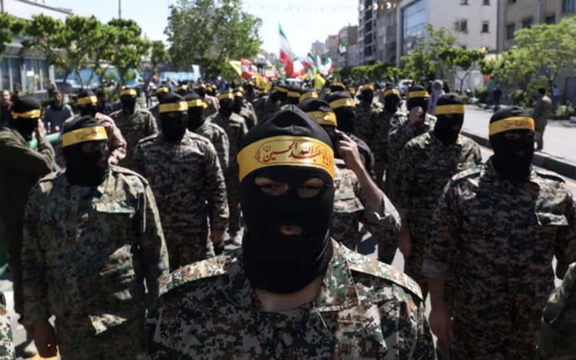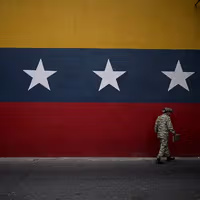US Sanctions Network Facilitating Shipments For Iranian Military

The United States announced new Iran-related counterterrorism sanctions on Thursday, targeting Oceanlink Maritime DMCC and its vessels.

The United States announced new Iran-related counterterrorism sanctions on Thursday, targeting Oceanlink Maritime DMCC and its vessels.
The new sanctions are a response to Oceanlink Maritime DMCC's involvement in shipping commodities for Iran's military, the US Treasury Department said.
These sanctions aim to isolate Iran and hinder its ability to fund proxy groups through financial restrictions. The UAE-based Oceanlink manages a fleet of over a dozen vessels heavily involved in transporting Iranian goods, according to the Treasury Department.
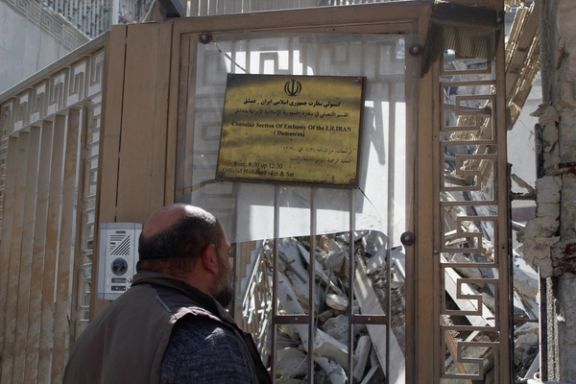
A member of Iran's National Security Commission claims this week's Israeli attack on Iran’s consulate in Damascus violates the Vienna Convention.
Abbas Golrou went on to warn that Iran “would not be constrained by any boundaries or red lines” in its response to the incident.
The attack, which occurred on Monday, resulted in the deaths of two Revolutionary Guard generals and five other IRGC officers. The attack followed a significant Israeli air strike inside Syria the previous week, claiming the lives of over 40, predominantly Syrian soldiers and Hezbollah militants.
Khaled Khiari, Assistant Secretary-General for Middle East, Asia and the Pacific in the Departments of Political and Peacebuilding Affairs and Peace Operations for the United Nations, said after the attack, “The rules-based international order is essential for international peace and security, which this Council is mandated to maintain,” said in his briefing to the UN Security Council after the attack.
The UN did not blame Israel directly other than referring to the attack as "reported Israeli attacks", but warned, “Any miscalculation could lead to broader conflict in an already volatile region, with devastating consequences for civilians who are already seeing unprecedented suffering in Syria, Lebanon, the Occupied Palestinian Territory, and the broader Middle East".
In the briefing, delegations such as Russia and China, key allies of Iran and fellow pariah states, voiced concerns that any attack on diplomatic and consular premises violates the Charter of the United Nations as well as the 1961 Vienna Convention on Diplomatic Relations and the 1963 Vienna Convention on Consular Relations.
The Monday airstrike was by all accounts an unprecedented escalation of the shadow war between Iran and Israel which has escalated in the wake of Iran-backed Hamas's invasion of Israel on October 7. Israel has on many occasions hit IRGC-related targets in Syria, but never before a diplomatic site, though experts such as Ronen Solomon from Intellitimes claim the complex was in fact a military complex for the IRGC.
Sources have speculated that the attack on Iran’s consulate was a retaliatory measure for a drone strike on Israel the night before, targeting a naval base in Eilat. A spokesman for the Israeli army said the drone was “made in Iran” and the attack was “directed by Iran.”
Despite the ongoing tensions in the region, Iran has refrained from direct confrontation with Israel, particularly amid the six-month conflict involving Iran-backed groups in Gaza, preferring to trigger its proxies to attack Israel from Lebanon, Yemen, Iraq and Syria.
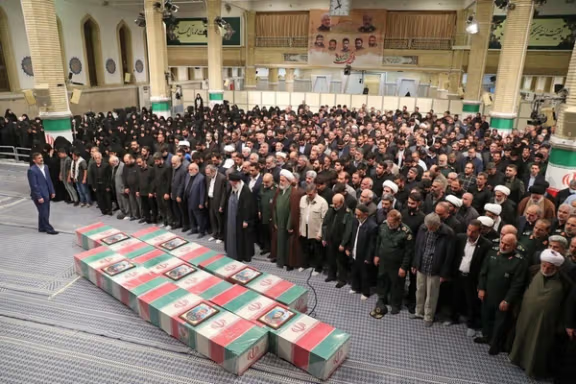
The Financial Times reported that suspected Israeli strikes have claimed the lives of 18 IRGC commanders and advisers since the Gaza war broke out on October 7.
According to the report, all of the slain IRGC forces were targeted in Syria, with 16 in Damascus, one in Deir ez-Zor and one in Baniyas.
Since the Gaza war broke out, Iran’s proxies have attacked Israel from Lebanon, Syria, Iraq and Yemen, and attacked US targets in the region as punishment for the US backing of Israel’s right to defend itself in the wake of October 7. In the most deadly day for Jews since the holocaust, over 1,200 mostly civilians were murdered and over 250 taken hostage.
Israel’s Monday attacks against Iran's consulate building in Damascus have been the deadliest since the inception of the ongoing conflict in the region, killing seven IRGC forces, including two top commanders.
The most prominent figure killed in the recent attacks was Mohammad Reza Zahedi, the highest-ranking commander of the Iranian Revolutionary Guards Quds Force (IRGC-QF) in Lebanon and Syria. Qods Force is the IRGC’s overseas branch coordinating proxy activities.
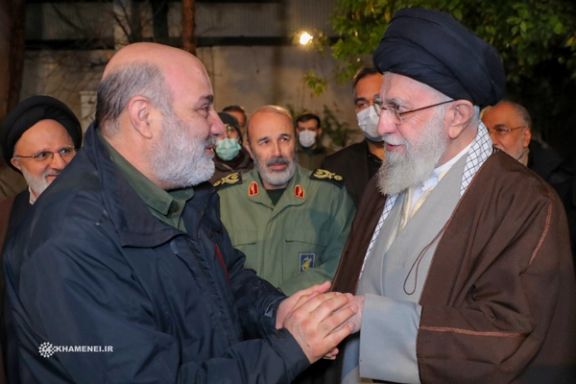
Zahedi, 63, joined the basij militias as a teenager and became involved in suppressing protesters. He was a mid-level commander during the Iran-Iraq war and was known by the pseudonym Ali Zahedi. In the mid-2000s, he went to Lebanon where he quickly established a strong network within Hezbollah, to the point he became “the only non-Lebanese member of the group’s council,” Amwaj Media reported.
Zahedi was appointed by Supreme Leader Ali Khamenei as the commander of the IRGC ground forces in 2006. He was later transferred to the IRGC Qods Force. According to his son, Zahedi had not returned to Iran since the start of the Gaza war, sparked by Iran-backed Hamas’s invasion of Israel, and only recently spent a few days in the country on the occasion of Nowruz, Iranian New Year.
The second most important person killed in Israel’s Monday strike was Zahedi’s deputy Mohammadhadi Haji Rahimi. Iranian media have called him the deputy coordinator of the IRGC Qods Force. According to reports, he had been a member of the Quds Force since it was formed and was one of its first commanders. Like Zahedi, Haji Rahimi was also a veteran of the Iran-Iraq war and participated in other regional wars in which Iran was involved in some way.
Hossein Amanollahi, Mehdi Jalalati, Mohsen Sedaghat, Ali Agha-Babaei, and Ali Salehi Rouzbahani were the other five members of the IRGC Quds Force who lost their lives in Israel’s Monday strikes.
In the past few months, two other high-ranking IRGC commanders were killed in suspected Israeli attacks in Syria: Razi Moussavi and Hojjatollah Omidvar.
Razi Mousavi (aka Seyyed Razi) was targeted by a direct airstrike on December 25. He headed IRGC’s ‘logistics’ and military coordination in Syria, getting weapons for and coordinating Iran-backed forces in Syria and Lebanon.
On January 20, a building in Damascus’s Mazzeh neighborhood was struck in an attack which claimed the life of Hojjatollah Omidvar (also known as Hajj Sadegh), a senior IRGC commander. He served as the deputy intelligence chief of Qods Force in Syria. Four other IRGC officers were also killed in the strike: Ali Aghazadeh, Saeed Karimi, Mohammad Amin Samadi and Hossein Mohammadi.
Among other IRGC victims of the alleged Israeli attacks are Behrouz Vahedi (targeted in Deir ez-Zor, March 26), Reza Zarei (targeted in Baniyas, March 1), Saeed Alidadi (targeted in south of Damascus, February 2), and Mohammadali Ataei Shourcheh and Panah Taghizadeh (both targeted in Damascus, December 2). The Iranian media have described them as “military advisers.”
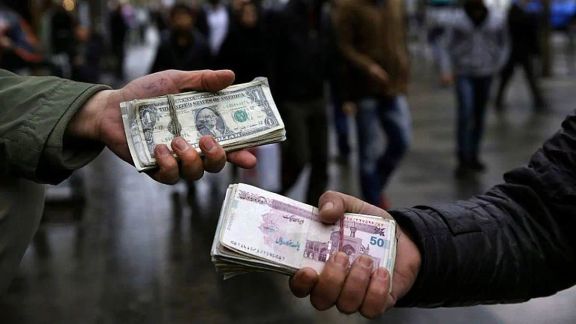
On Thursday, Iran's national currency experienced another plunge to an unprecedented low with the US dollar trading at 646,000 rials following this week's Israeli airstrike on Iran's consulate in Damascus.
It marks the highest recorded exchange rate for the American currency in Iran and represents an over 25 percent drop since early January. The Euro was also traded at 701,500 rials, while the British pound hovered near 818,000 rials, reflecting the economic turmoil within the country.
The airstrike this week resulted in the deaths of two high-ranking IRGC commanders and five officers, sparking vows of retaliation from the Iranian regime.
Abdolnasser Hemmati, the ex-chief of the Central Bank, voiced criticism against President Ebrahim Raisi's economic policy amid the crisis, stating, "Despite numerous assurances, the pricing trends of essential items and assets are taking an intolerable course. The public's perception of unfolding events... validates the economic neglect. Even among its proponents, doubts are arising regarding the government's effectiveness and management!"
The decline of the rial has been a long-standing trend since the 1979 revolution, but it notably accelerated in 2018 following the US withdrawal from the JCPOA nuclear deal and the subsequent imposition of sanctions on Iran's oil exports and banking sector. Remarkably, the currency was valued at 70 rials per dollar in 1978.
The sharp devaluation of the rial has exacerbated inflationary pressures over the past five years, pushing millions of Iranians below the poverty line. Official government statistics indicate an annual inflation rate of over 40 percent, though many experts believe the actual figure to be higher.
Iranian authorities have consistently displayed ambivalence towards the impact of international measures on the nation's economy. While attributing any shortcomings to the actions of the US and its allies, they simultaneously assert that these punitive measures lack substantial efficacy, further complicating the economic landscape within Iran.
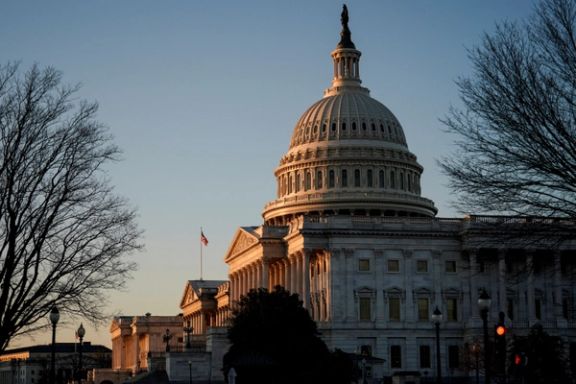
Republican senators are launching a probe into President Biden’s decision to issue a sanctions waiver to Iran, granting access to more than $10 billion, as first reported by the Washington Free Beacon.
The probe comes after the White House issued the third sanctions waiver to let Iraq pay Iran for electricity through non-Iraqi banks, less than a month ago.
Led by Republican Senator Tim Scott, the group of 13 lawmakers is pressing the State and Treasury Departments for exactly how much money Iran will be permitted to access in the next several months.
The probe is backed by several Republican foreign policy leaders, including Sens. Ted Cruz, Tom Cotton, Marco Rubio.
In their letter, the lawmakers wrote: “First, the waiver makes restricted Iranian funds more accessible to the Ayatollah’s regime, at a time when Iranian-backed aggression in the region is at a peak. Second, the administration appears to be disregarding congressional intent that any payments made to Iran remain severely restricted.”
Iranian proxy groups have increased their attacks in the region since Hamas’ attack on Israel on October 7 – with its attacks on American personnel in Jordan and vessels in the Red Sea.
CENTCOM Commander Gen. Erik Kurilla recently told the Senate Armed Services Committee that Iran remains undeterred in its support for Hamas, Hezbollah and the Houthis – and is not paying a price for its nefarious activities in the region.
While the Biden administration has maintained that the regime in Tehran can only access the money for humanitarian purposes, the letter suggests that the White House "appears to be disregarding congressional intent that any payments made to Iran remain severely restricted".
On that front, foreign policy expert Walid Phares argued on X that the US – alongside Israel and the “Arab Coalition” – could defeat Iran’s proxy militias in the Middle East in one month.
“But the #IranDeal & the #IranLobby are paralyzing the administration unfortunately. In 2025, a possible change in policy may occur. Until then, the #IslamicRepublic is not going to be deterred,” Phares wrote.
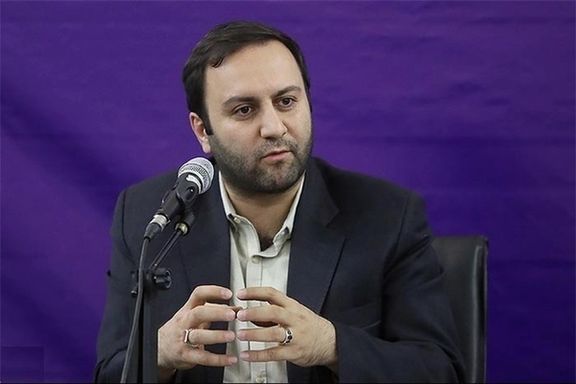
Iranian Member of Parliament Mohsen Pirhadi rejected the notion that Israel's recent attack on the Iranian embassy in Damascus constituted an assault on Iranian territory.
In an interview with Rouydad 24, Pirhadi emphasized that interpreting the attack in such a manner is not accurate, stating, "The Zionist regime's action is a heinous act and a violation of international law principles, but it should not be equated with an attack on our Iranian soil."
The airstrike on Monday targeted the Iranian embassy building in Damascus. The airstrike resulted in the deaths of seven Revolutionary Guards, including two senior commanders.
"Given the importance of the issue, the MPs will definitely delve into the details of the terrorist act and the plans of relevant agencies for how to respond to the crime and defend the country's security in the first session of the parliament after the end of the Norouz holidays," stated Pirhadi.
Despite tensions and conflicts in the region, Iran has refrained from direct engagement with Israel, particularly amid the six-month conflict involving Iran-backed groups in Gaza.
Pirhadi’s comments come as IRGC General Esmail Kowsari, a member of the Iranian parliament, asserted on Wednesday that Israel's attack on Iran's consulate in Damascus constitutes an encroachment upon Iranian territory, demanding a robust response from Iran. He dismissed the concept of "strategic patience" in the face of such incidents, affirming that Iran will promptly retaliate against Israel.
Kowsari further stressed that the United States should anticipate Iran's retaliatory measures, cautioning Israel against further attacks on Iran's interests.
“We are focused on disrupting Iran’s ability to finance its terrorist proxy and partner groups and support to Russia’s war of aggression against Ukraine,” said Under Secretary of the Treasury for Terrorism and Financial Intelligence Brian E. Nelson. “The United States will continue to use our full range of tools to target the illicit funding streams that enable Iran’s destabilizing activities in the region and around the world.”
Abram Paley, the US Deputy Iran Envoy said in a statement on X that “Financial supporters of Iran's Ministry of Defense will be subject to US sanctions for contributing to Iran's illicit funding streams. We remain committed to disrupting Iran’s support to terrorism throughout the Middle East and production of weapons that support Russia’s war of aggression against Ukraine.”
The US Treasury Department highlighted the recent activities of the Oceanlink-managed vessel HECATE, which conducted a ship-to-ship transfer loading Iranian commodities valued at over $100 million dollars from another sanctioned tanker.
In its statement, the Treasury underscored the series of US and Western sanctions aimed at curtailing Iran's destabilizing activities across the globe. Iran's network of proxies spans various countries in the Middle East, including Lebanon, Syria, Iraq, and Yemen.
